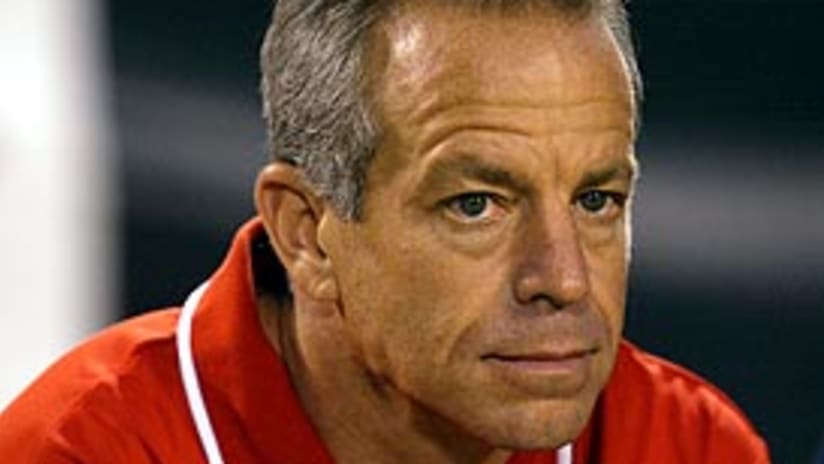Chicago Fire head coach Dave Sarachan sat down with Chicago-Fire.com to discuss the 2005 preseason and his club's progress thus far.
Chicago-Fire.com:
One week is in the books in Bradenton. How has Florida been so far for the Fire?
Dave Sarachan:
It's been a very good first week. We knew going in the weather and the fields would be good, and now we've been able to get in some quality training combined with some games. We mapped out our three-week plan, and at the end of week one we felt we've accomplished some things we thought were important - getting to know each other and getting a good fitness base and soccer base down.
CF:
What was the more important factor in that first week, getting the guys back to fitness or doing the "on the ball" work?
DS:
Frankly, we have so many new players and faces that it has been important to evaluate while, at the same time, being able to balance playing with building a foundation of fitness. Our group had a good start coming into camp. Their (fitness) level was pretty good, so we didn't have to focus as much on fitness. This week was a balance of both, but I think we've accomplished that.
CF:
With one week gone, what does "phase two" hold in store?
DS:
Phase two, it's really a continuation of phase one in knowing that it is a long preseason; we don't need to overdo things on the fitness end. We've got three games scheduled this week, and games are still important for evaluating purposes as guys are competing for jobs. But it is very much a continuation of week one where we will mix in some conditioning and some ball work with quite a bit of playing.
CF:
Every year, even with the same cast of characters, a team will take on a different personality, even if the changes are slight. Has this group's personality had a chance to show itself yet and, if so, what is this year's Fire squad like?
DS:
I think, as all groups first get together, there was a little bit of nervousness, with the younger guys especially. It didn't take long for them to get to know one another; I think that part has gone pretty well. We have enough veterans that know how to integrate new players into the team quickly. They seem to be a pretty serious group when we're training, but that's what you expect. For the returning guys, I think they have gone into a re-energizing mode, where you've got a lot of new guys and new faces to meet, and they've been welcoming on that end. I've been pleased with the group overall and their mentality is quite good.
CF:
Speaking of some of those new guys in the group, have any of them stood out so far in this early portion of training camp?
DS:
You know, I think all of them have held their own. If I were to put a couple a little ahead of the others, I would say both Chris Rolfe and Will John have been a little more steady and above the curve. There's also been some solid play from Jack Stewart and Gonzalo [Segares]. There's not a great variation between them all, but maybe Rolfe and John are just a little bit ahead.
CF:
You've only played a pair of games thus far, but are there any things you can take out of those matches?
DS:
Well, game one is your starting point, so there were some things as a collective group that we needed to do better and we addressed that the next day. The results aren't the true importance here, it's the matter of doing the little things right. From the first game to the second, in terms of how the team moves, how players press, how you drop off and work together, I thought there was an improvement from game one to game two on that level. That's why we play, because that's the best laboratory to learn in.
CF:
This three-week stretch will be the longest single leg of a preseason that the Fire has been involved in since you took over the team in 2003. Are you and the staff worried about burnout, and is there a reason why the trip is as long as it is?
DS:
It is a long stretch. Personally, there are two reasons why I wanted to spend a little more time down here than in past years, the first being the amount of numbers we have - it's the most players we'll have in quite some time. And along with that, just getting to know the group and evaluate them. It is a good thing to have those numbers so you can sort of pace yourself through the three weeks so you don't put the burden on less numbers and a lot of playing. And familiarity, just getting to know another does help. As far as burnout, I think we do a pretty good job at balancing the free days, some off days, and the one-a-days. We're trying to make sure we don't burn them out, but it is tough.
Sarachan: Week one went well

More News
More News
-
Transfer Tracker
Chicago Fire transfer Georgios Koutsias to FC Lugano
-
Transfer Tracker
Chicago Fire transfer Brian Gutiérrez to Chivas
-
MLS Cup 2025 delivers record viewership & social engagement
-
Transfer Tracker
FC Cincinnati re-sign defender Alvas Powell
-
FIFA 2026 World Cup: How every team qualified









